#the half-life of my heart
Text
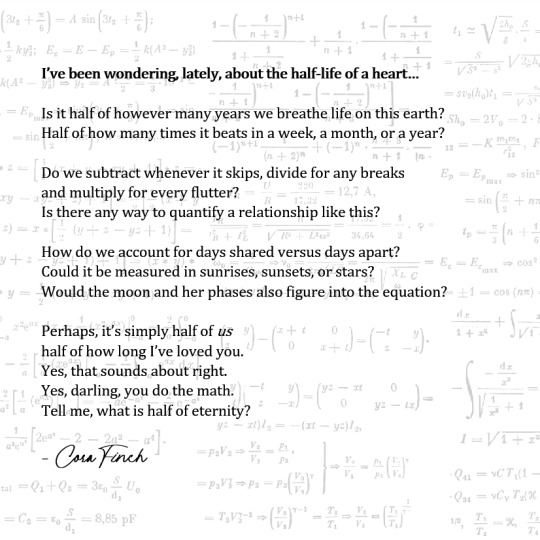
I’ve been wondering, lately, about the half-life of a heart…
Is it half of however many years we breathe life on this earth?
Half of how many times it beats in a week, a month, or a year?
Do we subtract whenever it skips, divide for any breaks
and multiply for every flutter?
Is there any way to quantify a relationship like this?
How do we account for days shared versus days apart?
Could it be measured in sunrises, sunsets, or stars?
Would the moon and her phases also figure into the equation?
Perhaps, it’s simply half of us
half of how long I’ve loved you.
Yes, that sounds about right.
Yes, darling, you do the math.
Tell me, what is half of eternity?
- Cora Finch
#poetry#love#love poem#enternity#forever love#infinite love#unconditional love#math#half-lives#immeasurability#spilled ink#thoughts#my writing#cora finch#heartsongs#poem#157#the half-life of my heart
3 notes
·
View notes
Text
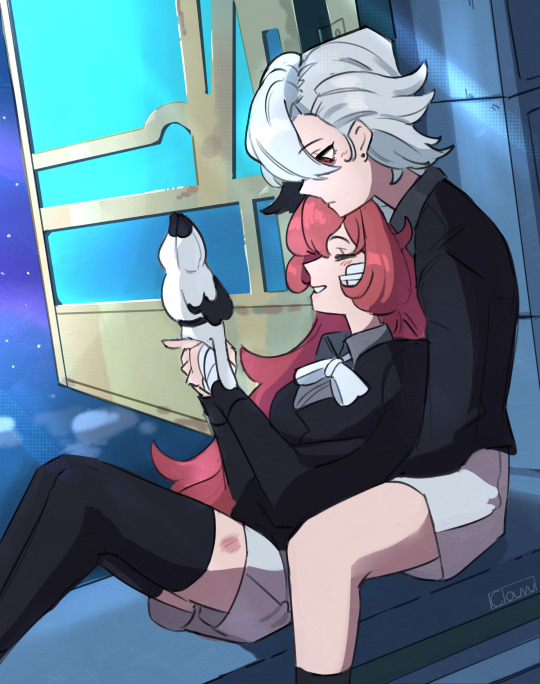
Nothing in the world belongs to me
But my love, mine, all mine
#genshin impact#arlecchino#peruere#clervie#ouhhhhhhhh im never gonna be able to emotionally recover from watching that animated short#ever since it came out a couple days ago just thinking of these two makes me feel like my heart is physically being ripped in half#i cant stop thinking about how Clervie was the only person in Arlecchino's life that she truly loved#like dont get me wrong Arlecchino loves her children in her own detached-fucked up way as much as any person with her amount of trauma can#but Clervie meant so much to her that even just her presence alone kept Arle's curse at bay#and it seems that no one other than Clervie herself has ever been able to break this unemotional/detached wall that Arle has put up#and maybe no one else ever will#DONT GET ME WRONG I still fw arle x other female harbingers like that shit is still peak#but oh my god the idea that arle never moved on after clervie's death and will never love anyone the way she loved her makes me want to SOB
3K notes
·
View notes
Text

Hala Alyan, from The Moon That Turns You Back: Poems; "Half-Life in Exile,
2K notes
·
View notes
Text
OK correct me if I'm wrong, but I feel like the main 'yin/yang' parallel with Atsushi and Akutagawa is not something like 'this one is bad but secretly has a good side and this one is good but secretly has a bad side'.
I feel like it's more about 'who they are at their core vs who they choose to be'.
At his core Akutagawa is kind and at his core Atsushi is not. But despite this Atsushi tries every day to make the kinder choices and I love him so much for it. He has to work so hard to be good.
He wants to be a bitch SO bad I know he does but he tries his best to help people and be nice (sometimes he fails but that's OK <3)
Atsushi doesn't always WANT to help people, a lot of the time he's selfish and scared, but he does help people anyway. He keeps helping people over and over again. There's still some selfish motivation to it, and his initial motivation for helping people was because the headmaster told him that's all he was worth, but overall he does care about the people he helps and it weighs on him if he fails to save them. And of course, as the series goes on he starts helping people more because he can rather than because he feels like he needs to.
In Akutagawa's case, he's still capable of being kind but his environment led him into being someone who chooses to hurt people. But he's always been a protector at heart. In the start he was bad compared to Atsushi because he was choosing to hurt people and keep the cycle of abuse going. Just like how Atsushi developed in why he saved people, Akutagawa starts to get redeemed when he chooses to not just act on his rage. Not only does he start to spare people, but he speaks more kindly to them (apologising to Higuchi and telling Kyouka he's proud of her). It all culminates into the moment he chooses to help Atsushi and sacrifice himself for him, going back to his core value of being a protector. Even when he's finally revived, he keeps this role in his new position as Aya's Knight.
I kind of see the streaks of white in Akutagawa and the streaks of black in Atsushi not as their 'hidden sides' but as their fundamental selfs. That's who they are at their core, and their main colours (black for Akutagawa and white for Atsushi) are how they're presented to everyone else and how they try to have people see them as.
#I'm just spitballing half of this but these are also my genuine thoughts on these two and their yin/yang parallels#I'll never get over Akutagawa being a protector at heart and getting that side of him buried with rage from growing up in the PM and-#-Dazai's old teachings#also Atsushi being selfish at his core is very important to me. He's not a typical 'kind hearted' shonen protagonist. He's kind not because#-that's how he’s always been but because that's how he chooses to be#I think that kind of character is even more admirable to me#it also fits well with Dazai being his mentor. Since Dazai also doesn't have that initial desire to save people just out of kindness.#He saves people as a promise to his dead friend that wanted him to live a good life#in fact that actually fits with Jouno too#now that I think about it quite a few bsd characters fit into that 'not kind because they were born that way but because they chose to be'-#-archetype#hell yeah. That's kinda cool I like that#bsd analysis#Akutagawa#atsushi#akutagawa ryuunosuke#atsushi nakajima#sskk#shin soukoku#<- Not a ship post but adding this tag since I consider that their duo name too#bsd#bungou stray dogs#bungobble my post
721 notes
·
View notes
Text
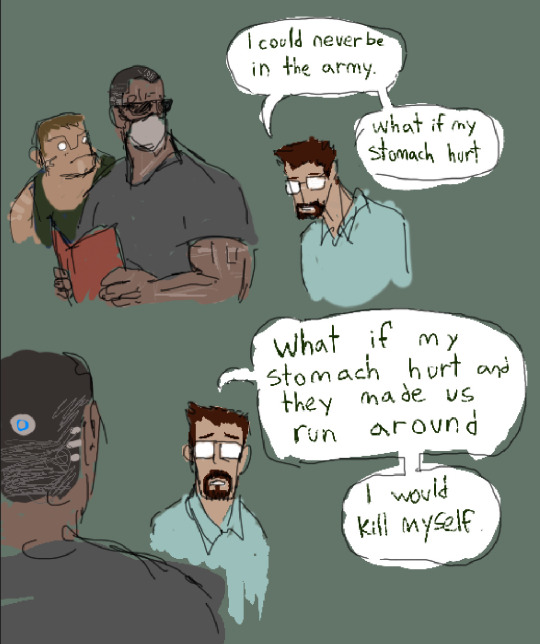

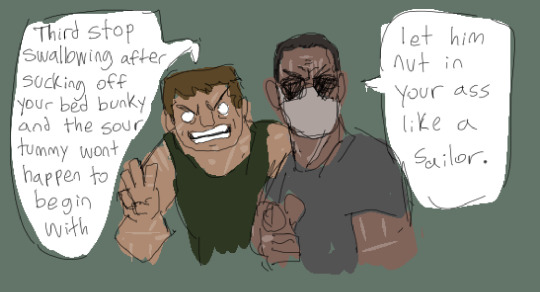

Doomguy and Master Chief give Gordon Freeman some advice based on this post under readmore
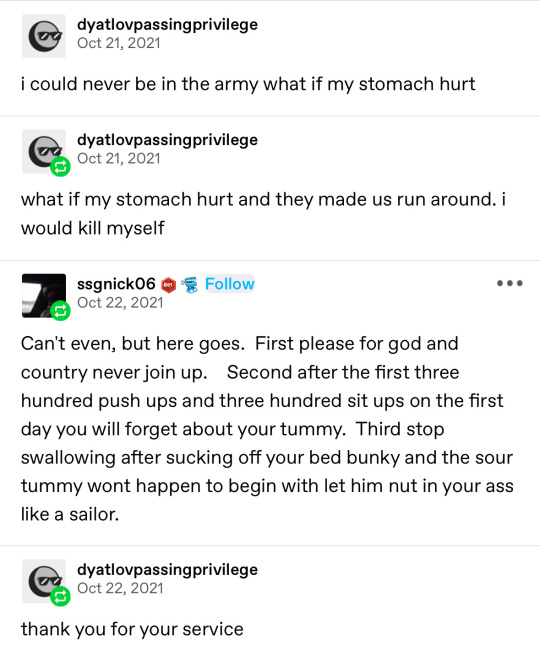
Struggling to get my old iPad to draw again by going thru my freeguy117 tag and finding gems like these
#freeguy117#you know these boys never really left my heart I promise#Gordon freeman#master chief#john 117#doomguy#half life#doom#halo#crossover
2K notes
·
View notes
Text
something wholesome i found on steam
This guy made a GMod model of a homemade Headcrab plush he had as a kid!
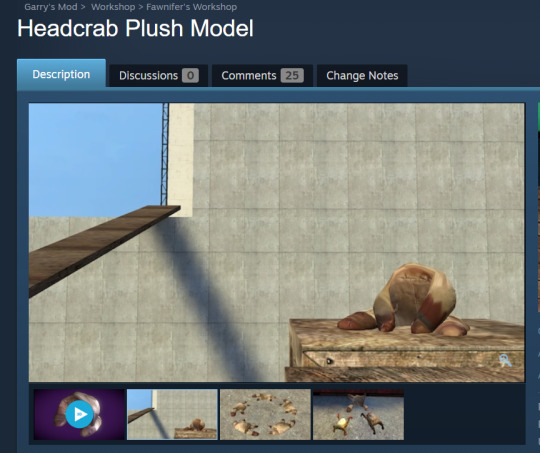
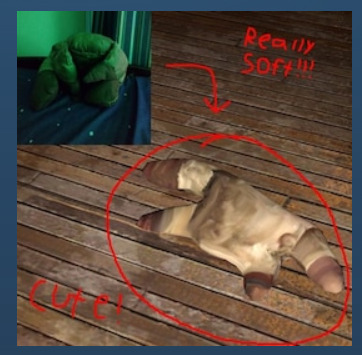
You know what's even more heartwarming? The backstory behind it!

This makes me see Headcrabs in a different light.
2K notes
·
View notes
Text

commission for @/dilfslayer1080p thank you!
#art#hlvrai#hlvrai benrey#half life but the ai is self aware#it's rare when i do a commission with such an ease in my heart that's great
563 notes
·
View notes
Text
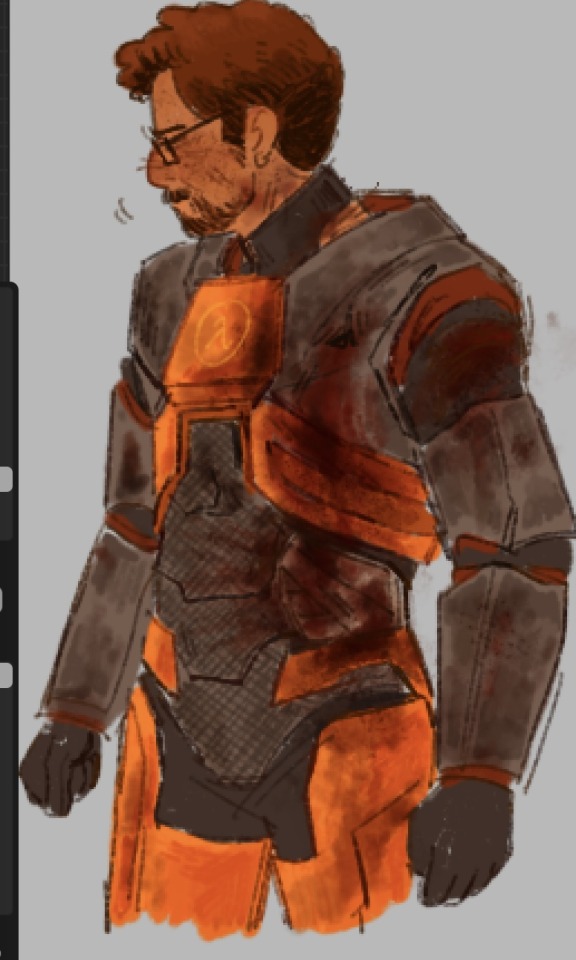
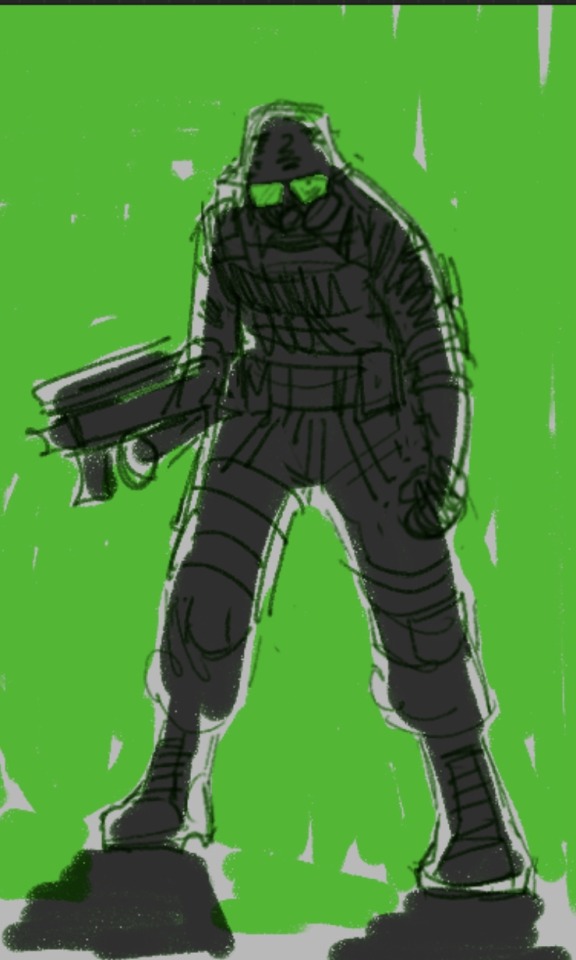
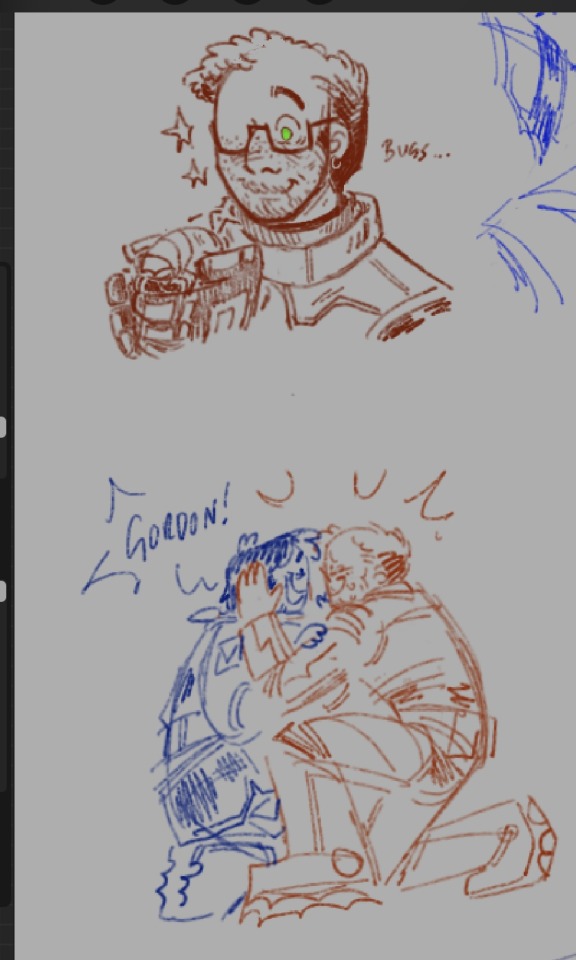

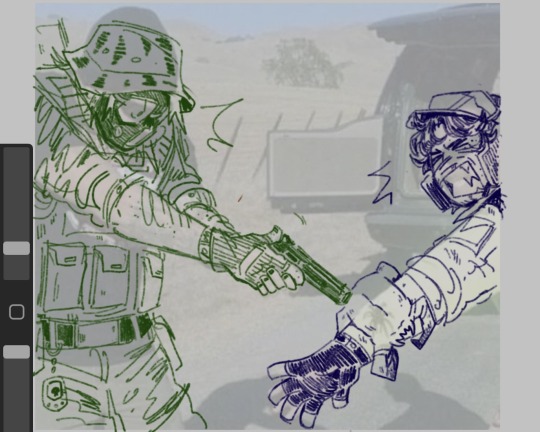

moar hl scraps…. does a pose
#There's I think a couple repeat doodles srry I cldnt crop it right. wgatever#that 1st one is a study .... I didn't realize how. Fucked up his hev suit is by th end of everything like holyshit.....#I was lookin at the pic I was using for th study and was like. 😟 that's so much blood.... that's just like..#A big gouge....... uueueeeughh......#LIKE HIS WHOLE LEFT SIDE IS BLOWN OPEN. CHRIST#I will also say I dont care 4 th hl2 HEV but I like the way the chest piece is shaped#I kinda mix them up when I draw it..... does another pose#half life#half life 2#hl1#hl2#gordon freeman#barney calhoun#freehoun#alyx vance#adrian shephard#opposing force#blue shift#That middle one of Adrian I'm mayyybe gonna turn into a full piece. I just gotta get the pose better...#Anyway listen to cowboy Dan by modest mouse. Adrian song. I know this#Th one with Barney and Adrian is nonsensical I just thought it was funny#In my heart during the black mesa incident I think barney separately teamed up w both Adrian and Gordon.#Not for very long. But I like 2 think about it.#<- making shit up
829 notes
·
View notes
Text
Drawing minish cap link everyday til I no longer have artblock™️

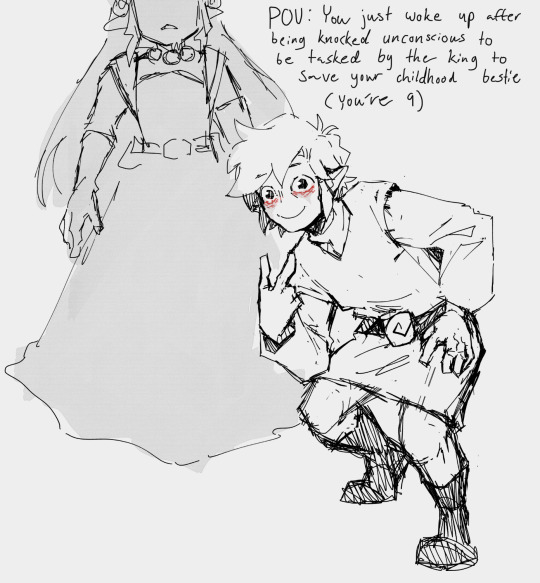

What difference three days make lol
#life is kicking my ass from every direction nowadays#playing mc is my current comfort <3 it’s so cute and tiny and small and a#so ye anyways i’d give this link everything he is so important to me#I love Zelda too she stole my heart within the first half minute#minish cap#loz mc#the legend of zelda
5K notes
·
View notes
Text
love is a gentle thing yours is thicker than a velvet ring

#half life#hl#hl fanart#gordon freeman#barney calhoun#freehoun#prerescas freehoun will forever have my heart
709 notes
·
View notes
Text
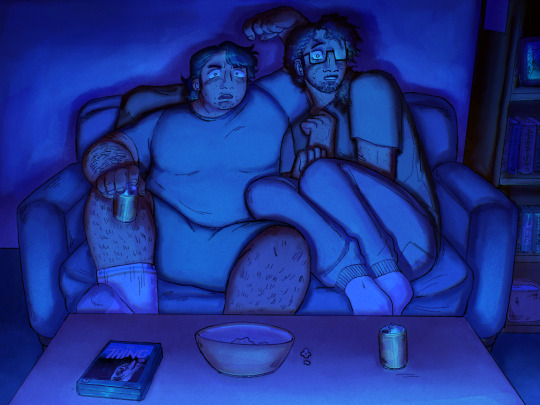
movie night
#This piece is dedicated to the scene in EVERY FUCKING PRE RESCAS FREEHOUN FIC where they watch the thing or something#and then they KISS during the credits <- this part is not in every fic but in my heart 🧡#tbqh idk if I like this or nawt but whatever I'm tired of it sitting in my files. Gordon's cute at least#anyway#gordon freeman#barney calhoun#freehoun#half life#hl#my art#id in alt text#Barney and Gordon on the worlds smallest shittiest couch in the dark what will happen……. tee..hee….#I feel the need to clarify also they’ve seen the thing like one morbillion times. but they react like it’s the first time everytime#They watched this together back when they first met and Barney was like. ‘ur so fuchs lol’ and Gordon was like ‘yeah well you’re Mac’#and then the scene in the thiokol skidozer happened and they both got really quiet#<- joke for me mostly . But if you know . Yeagh#I want to rewatch the thing so bad now goddamnitttttttt#euuaagghhhhhhhhhhhh
259 notes
·
View notes
Text
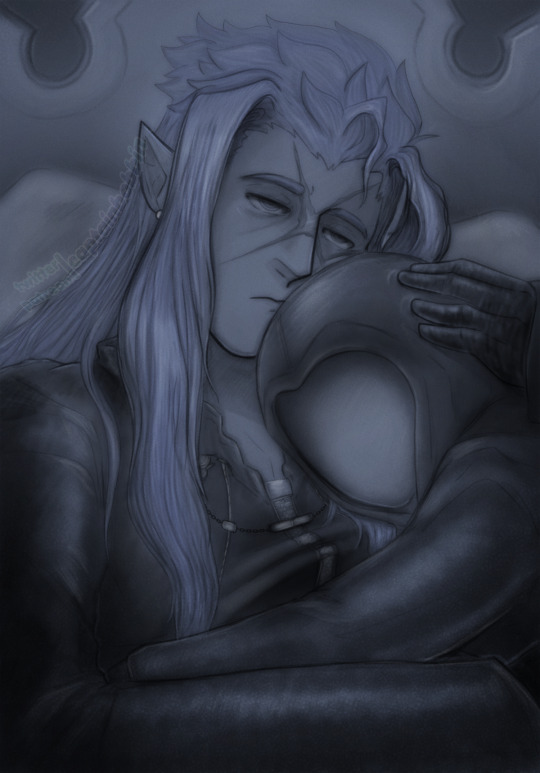
happy birthday, saix
#happy 7/7 day yeehaw#saix#isa#xion#kh#kingdom hearts#captainbobbin#this is absolutely 100% NOT ship art to me Isa is Xions dad pls dont be weird#this is kh3 era exhausted saix trying so damn hard to keeo everything together#xion is all hes got anymore and he will kill himself trying to make her live again. he must#he has to write his wrongs and make sure this child gets the life he never had. he ruined everything. he needs to make amends.#xion is his charge. his responsibility. his pup. the kid he didnt know he wanted.#he would and will die for her. but to be alive now in this haunting cursed half-life is so exhausting#i would add more but. my general vibe is sad dad isa please check out my fics for more
232 notes
·
View notes
Text
One thing that I feel is really interesting and often forgotten about Essek is that fundamentally, his characterization has been from the start based upon his desperation for external perspectives and connection, which, along with much of his narrative and mechanical positioning, means that he actually has an extraordinary and almost (but not actually, as I'll show) counterintuitive capacity for both growth and trust.
(Buckle in. This is a long one.)
In particular, I would argue, knowing now that many places where the plot touches Ludinus have long been marked for connecting back into the current plot, that he was quite possibly built as a prime candidate for radicalization by the Ruby Vanguard. He felt isolated from his culture, he was desperate for other connection, and he was certainly of the type to believe he was too smart to be drawn into such a thing, given his initial belief that he could control the situation and the fallout. If things had gone any other way, he easily could've been on the other side by now.
As such, he has been hallmarked by being fairly open to suggestion, perhaps for this reason, but the thing about that kind of trait is that it is both how people are radicalized and deradicalized. This is certainly true of Essek, who experienced genuine kindness and quite frankly strangeness from the Nein and was able to move from the isolation the Assembly had engendered to meaningful and genuine connection, largely propelled by his own internal reflection. By the time Nein are aware of his crimes, he's already begun to express regret to an extent and, furthermore, doubt in the Assembly, including explicitly drawing a line against Ludinus, even in a position where he was on his own and probably quite vulnerable.
Similarly, when the Nein reach the Vurmas Outpost some weeks later, he has moved from regret for the position he's ended up carrying a heavy remorse. This makes sense! He's fairly introspective, seems used to spending a lot of time in his own head, and was left with plenty to mull over. It's not some kind of retcon for him to have progressed well past where the Nein left him; it just means he's an active participant in the world who has done his own work in the meantime.
This is another interesting aspect to him. I've talked about this a bit before but I cannot find the post so I'll recap here: antagonists in D&D have significantly more agency than allied NPCs. Antagonists are active forces, against which the party is meant to struggle; allies are meant to support the PCs, which means they tend to be more passive in both their actions and their character growth. Essek was both built as an antagonist, in a position that gives him significant agency, and also was then given significant opportunity to grow specifically to act as a narrative mirror for Caleb's arc. Even when he becomes a more traditional D&D ally, he still retains much of that, though he occupies a supporting role.
I believe that this is especially true because of the nature of Caleb's arc, which I've already written on; the tl;dr of this post is that Caleb is both convinced that he is permanently ruined and also desperate to prove that change is possible. Essek is that proof, because he is simply the character in a position to do so. But this also means that his propensity for introspection and openness is accentuated! He has to do the legwork on his own, for the most part, because that's where he is in the meantime.
But he still ends the campaign necessarily constricted; he is under significant scrutiny, he's at risk from the Assembly, and he goes on the run fairly soon after the story ends. He spends most of the final arc anxious and paranoid, which is valid given the crushing reality of his situation. It would be very easy to extrapolate that seven years into this reality, he would be insular, closed off, and suspicious of strangers, even in spite of the lessons he's learned from the Nein and their long term exposure.
So seeing his openness and lightness now is surprising, but at the same time, given this combination of factors in his position in the narrative over time and his defining traits, it's not by any means unreasonable.
But one thing that I found so delightful is how much trust he exhibits, which is obviously a wild thing to say about Essek in particular, given much of what he learns is both earning and offering trust, which was something he says explicitly in 2x124 that he's never really experienced: "I've never really been trusted and so I did not trust." It makes up much of the progression of his relationship with Caleb, and the trust that he is offered by the Nein in walking off the ship is the impetus he needs to grow.
But I think it's easy to talk about trust when it comes to people who have proven themselves to you or to whom you've ingratiated yourself, and that's really the most we can say about Essek by the time he leaves the Blooming Grove. There is this sense in a lot of discussion of trust (not solely in this fandom) that it is only related to either naivete or love, but there's far more to it. Trust at its best is deliberate—cultivating an openness to the world at large is a great way to combat cynicism and beget connection instead. It allows a person to maintain curiosity and be open to experience, but it can be incredibly difficult to hold onto.
It is clear that the Essek we meet now is a very pointedly and intentionally trusting individual. He trusts Caleb and by extension Caleb's trust in Keyleth, as he shows up and picks up a group of strangers from a foreign military encampment and walks in without issue. He trusts the Hells to follow his lead moving through Zadash and to exhibit enough discretion so as to avoid bringing suspicion upon all of them. He trusts that Astrid will respond well to his entrance, but he also trusts himself and the Hells enough to execute a back-up plan in the case that she doesn't. In the end, he even trusts them enough to give them his name and identity.
He doesn't scan as someone who has spent half a dozen years living like a prey animal, afraid of any shadow he runs across in an alley, withdrawn into himself and an insular family, which would've been an easy route for him to take. He scans as someone who has learned the kind of trust borne of learned confidence and a trained eye for good will and kindness, which are crucial weapons one would need for staving off cynicism in his circumstances—as if he has survived thanks more to connection and kindness than paranoia and isolation. (If we want to be saccharine about it, he scans quite poignantly as a member of the Mighty Nein.)
So it is easy to imagine this trust and openness as a natural progression of his initial search for perspectives external to his own cultural knowledge. Though he makes those first connections with the Assembly to try to vindicate his personal hypotheses, he finds in them exposure to the deepest corruption among Exandrian mortals, which could've—and did, for a time—turned him further down that same dark path.
But it's also this same openness to exposure from the wider world that allows the Nein to influence him for the better, and in spite of the challenges he's certainly faced simply surviving over the past seven years, he seems to have held onto this openness enough to move through the world with self-assurance and a willingness to extend the kinds of trust and good will that he has been shown.
(I would be remiss not to mention that I was reminded about my thoughts on this by this lovely post from sky-scribbles and their use in the tags of 'light' to describe Essek's demeanor this episode, which is really such an apt word for it.)
#something something hope is a weapon hope is a discipline hope is a garden to cultivate!!!#HE'S SO GOOD HE IS TRULY EXEMPLAR OF THE WHOLE PHILOSOPHY OF THE NEIN AND I DO NOT THINK THAT'S AN ACCIDENT#truly just like. enormous proponent of letting trust and curiosity into your heart regardless of the horrors.#it's hard and it makes you more vulnerable and sometimes it hurts so so much but it will also save your fucking life!#cr spoilers#critical role#essek thelyss#cr meta#I was gonna apologize for the length but I'm not sorry. I'm also not sorry for being insane about him but he's so special to me.#head in my hands he's so GOOD HE'S BEST BOI! GUIDING LIGHT NORTH STAR!!! LOOK AT HIM!!!#also truly if i had two nickels for a span of time with no essek sightings where I wrote a lot of fic#with deliberate personal acknowledgment that I was writing some pretty maximal arcs for him in terms of character growth#and then end up getting essek for half an episode and having to go OH WE'RE GOING THAT FAR ACTUALLY. FUCKING INCREDIBLE.#yanno. two nickels. but good lord I am thriving that it's happened twice#augh this is ONE of the pieces I need to write this week. we're not gonna talk about it
343 notes
·
View notes
Text
I am drooling at the idea
What would you call this? Hazardous bullet???
Also my first non freehoun post btw 🫣 but it will arrive soon


#laughs in gay#tf2 heavy#gordon freeman#i have been daydreaming about them finding themselves during a book fair 🤤🤤🧡🧡🧡 my heart#tf2#half life
148 notes
·
View notes
Text
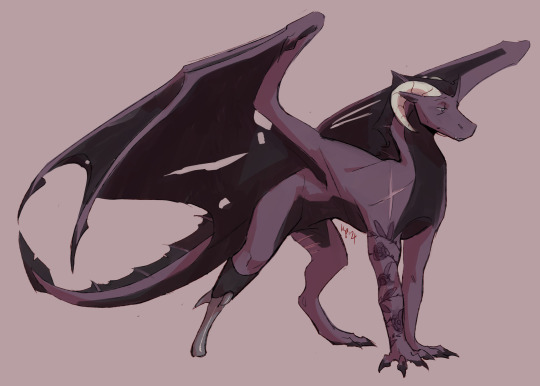
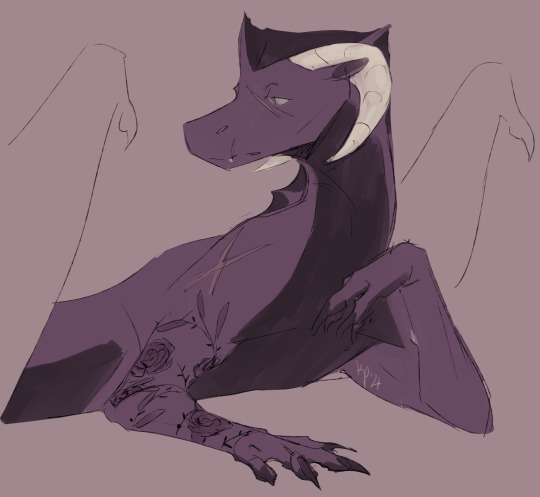
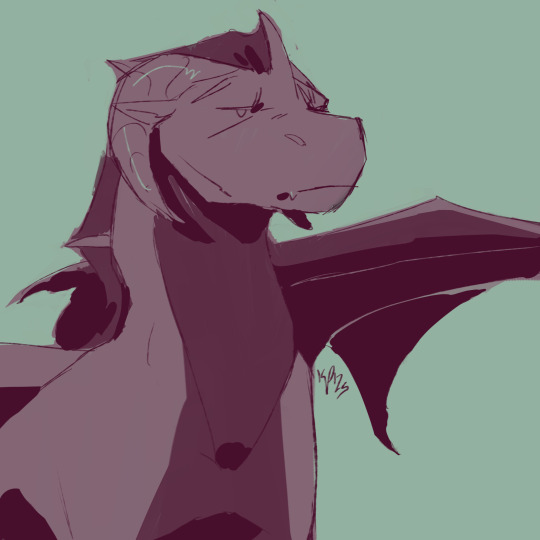
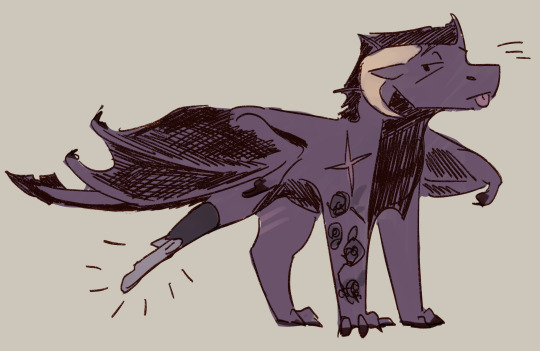
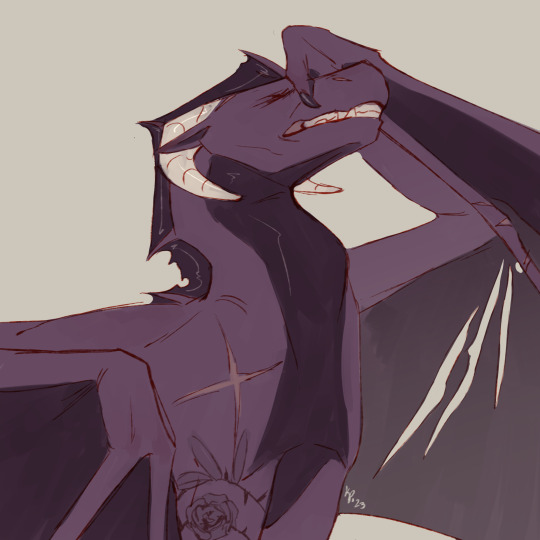
she's my most specialest
#art#dragon#dragons#ocs#thicker than water#serena#my art#digital#apparently i forgot to post this earlier oops#yeah she's fucking. twelve years old now....in real people years not in-canon#half my life....#the honeybee brainrot is going strong but she will always be in my heart and on my canvases
269 notes
·
View notes
Text

saw this meme and just had to do it for Fates patchilles
#patrochilles#achilles#patroclus#achilles: brave son of menoetius light of my life most faithful companion nearest and dearest to my heart good morning!! 🥰#pat still half asleep: ..... hi. ig#they're so dumb your honour#omegaverse au#tagamemnon
97 notes
·
View notes